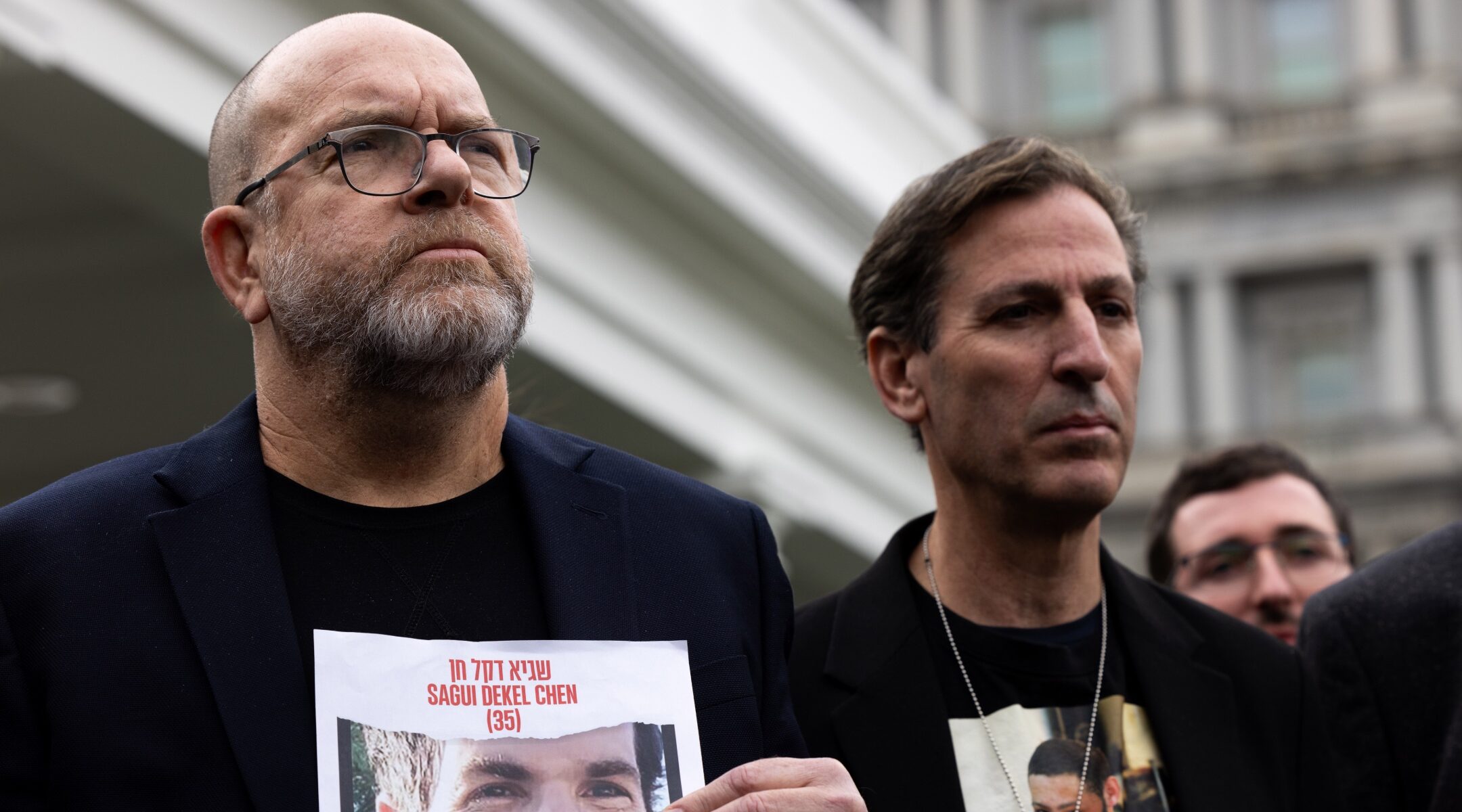WASHINGTON — The father of a hostage held in the Gaza Strip marked the one-year anniversary of Hamas’ invasion of Israel by decrying Israeli Prime Minister Benjamin Netanyahu in a speech to American Jews.
Jonathan Dekel-Chen, whose son Sagui was captured by Hamas terrorists on Oct. 7, 2023, delivered the speech at an American Jewish Committee event in Washington, D.C., on Monday. It was remarkable for drawing a typically nonpartisan U.S. Jewish organization into the crucible of Israel’s political crisis. The AJC did not know in advance what Dekel-Chen was going to say.
“The soul of Israel, and I say this out loud to the AJC and beyond, the soul of Israel cannot survive if the hostages don’t come home,” he said, speaking to a packed room at the Sixth & I historic synagogue.
He traced the disaffection to political clashes over the Netanyahu government’s efforts to weaken the judiciary.
“The national crisis of faith plaguing our country began beforehand, in January 2023, when the same government tried to stage a judicial coup,” he said. “The crisis of faith receded momentarily around Oct. 7, in solidarity with the hostages and our brave soldiers, but the crisis reemerged, this crisis of faith, with even greater urgency, with the popular understanding that the actions of our government clearly showed they did not prioritize the return of the hostages beyond lip service.”
Netanyahu, instead of negotiating in good faith, was given to “childish” press conferences and “inflammatory speeches,” Dekel-Chen said. “Prime Minister Netanyahu only amplifies the ugliest parts of Israeli politics, leaders unwilling to take any accountability for the situation in which Israel finds itself, and unable to offer a workable vision for its future,” he said.
Dekel-Chen, who spoke longer than anyone else, was followed by second gentleman Doug Emhoff, who recited the prayer for peace found in the Conservative movement’s official prayer book. Michael Herzog, Netanyahu’s envoy to Washington, also spoke.
Dekel-Chen’s speech was the latest attempt by Israeli opponents of Netanyahu to recruit major American Jewish organizations to their cause. For the past year, anti-Netanyahu groups have been pressing American Jewish leaders to shuck decades of reluctance to criticize Israeli security policies.
The demands to call out Netanyahu have intensified as talks over a ceasefire and hostage release have stalled. Last November, an initial ceasefire-for-hostages exchange resulted in the release of more than 100 captives and hundreds of Palestinian security prisoners, but negotiations over the past 10 months have not borne fruit. The Biden administration has said that Hamas is principally to blame for the impasse but has criticized Netanyahu for moving the goalposts during negotiations.
The AJC has not publicly criticized Netanyahu over a hostage deal, and Dekel-Chen apologized to the group for catching it off guard.
“I realize that my words today perhaps are not exactly what you were expecting. I apologize to the AJC if some of it seems perhaps a little inappropriate on this solemn day,” he said.
The group’s CEO, Ted Deutch, thanked Dekel-Chen for his speech but emphasized that AJC did not see it coming.
“That was not the speech we expected,” said Deutch, who avoided endorsing or rejecting Dekel-Chen’s call.
“The strength of the Jewish community especially in the Oct. 7 world is in our unity as a people,” he said. “We talk often about the power of Israel’s democracy, the many voices within Israel. We acknowledged that your voice is one of many voices and we’re grateful you chose to be here today.”
A survey by the Israel Democracy Institute, released on the one-year anniversary of Oct. 7, found that most Israelis want the war in Gaza to end, and that a sizable majority say freeing the hostages should be the government’s highest priority in the war. In the United States, meanwhile, many large Jewish organizations have treaded cautiously in discussing a ceasefire deal out of respect for the Israeli government’s strategic prerogatives.
“We are in the business of humanitarian support and loving and caring and supporting Israel in every way that we possibly can,” Eric Fingerhut, the CEO of the Jewish Federations of North America, said in a September interview. “But we know that ultimately the negotiation of any agreement is the responsibility of the government of Israel, and we respect that role. And so that’s not a place where we feel that we should be replacing what the government of Israel has the responsibility to do.”
But that may be changing. Some Jewish groups did publicly call for a deal after Hamas murdered six hostages who were known to be alive until just hours before Israeli troops found their bodies in August. The following month, on the day that Netanyahu addressed the United Nations General Assembly, a number of left-leaning and centrist organizations, including ones representing the Reform and Conservative movements, joined an appeal to Israel’s government to “seal the deal.”
Dekel-Chen, however, also called on some American Jews to temper their rhetoric: He said he had advice for J Street, one of the preeminent Jewish groups opposing Netanyahu.
“A few weeks back, I asked them to abandon, at least for now, the two-state solution as a talking point,” he said, referring to calls for a Palestinian state alongside Israel. “Not because I don’t believe it, simply because it’s a non-starter in terms of where Israeli society is today.”
With additional reporting by Ben Sales.
JTA has documented Jewish history in real-time for over a century. Keep our journalism strong by joining us in supporting independent, award-winning reporting.






